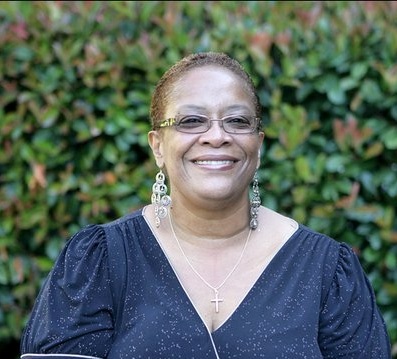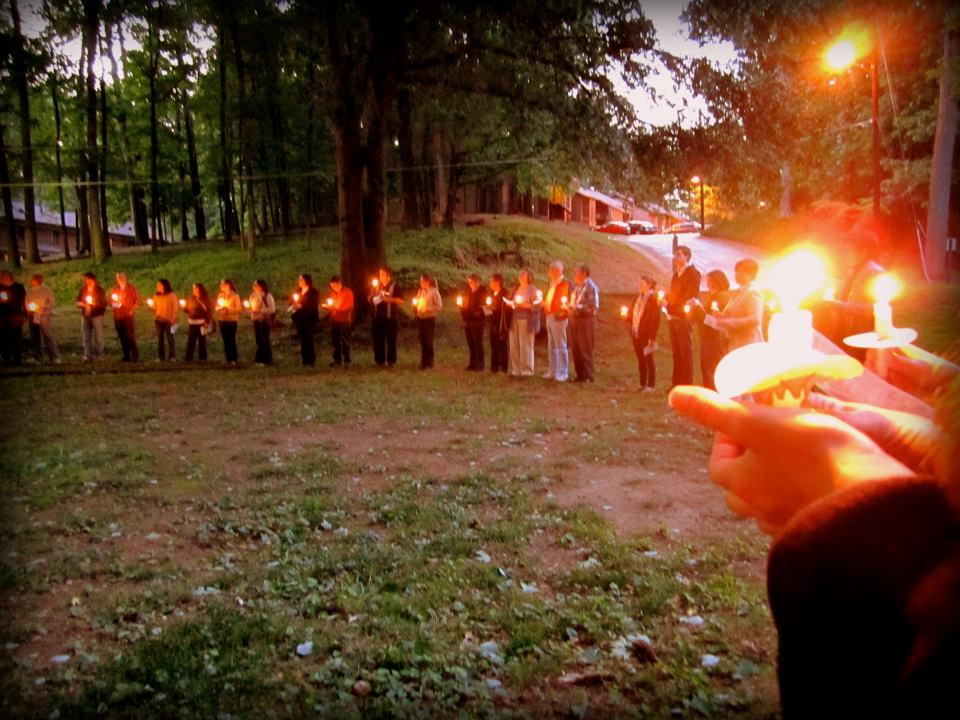Fuller Theological Seminary
Interview with Jennifer Ackerman, 2nd Year Master of Divinity Student
 View and print as PDF.
View and print as PDF.

On April 24, 2012, I interviewed Jennifer Ackerman, a second-year Master of Divinity student at Fuller Theological Seminary, under care for ordination in the Presbyterian Church (U.S.A.). She presents a community deeply committed to civil dialogue and diversity, generally unperturbed by controversy or major division. For, while students certainly have strong opinions, Fuller has worked hard to create a safe space for all voices to be shared.
What justice issues are of deepest concern to the students and staff of Fuller?
I am deeply entrenched in justice work, so I may have tunnel vision. I’ll try to speak to the wider community, but my perspective may be skewed. I work with the Ogilvie Institute of Preaching, the newest initiative of the Brehm Center for Worship, Theology, and the Arts. The Ogilvie Institute brings together worship, preaching, and justice, not only in seminary, but also for people active in ministry. This May, we are hosting and organizing a conference called “Inside-Out Church: Preaching, Leadership, and Community for the Sake of the World.” That conference asks us to move from focusing on “growing numbers” to prioritizing “growing outwards.” The conference’s mission says,
The Church often seems locked inside itself. So much of the current industry of church-life is built on the assumption that the goal is to become more attractional: how can we get more people to come to us?
But what would happen if we turned the paradigm inside out? What would it be like if we went about what we do in the church—e.g., preaching, leadership development, and community-building—for the sake of their neighbors not in the church.
Other issues students address: genocide, peace in Israel, AIDS/HIV. But the real question is what should we be doing right now in our local communities, in our backyards? We see a lot of issues with churches trying to grapple with becoming multicultural communities or with embracing and serving the local multicultural population.
What kinds of organizing are taking place on campus?
There are several groups for justice issues: the “Just Peacemaking” initiative, focusing on Israel and Palestine; cross-cultural groups; and others. But groups often seem somewhat segregated. I’m not sure how much we are cross-populating. I’m not sure how much we’re talking to each other. People have their niches. And so communication becomes a big problem. It becomes difficult to plug into these groups because they are rather disparate and nebulous. Of course, it is right that there are so many different kinds of energies around so many different issues, because none of us is called to take care of everything. I’m excited to see different things pop up. It’s just hard to keep track of what is going on. There’s not much coalescing.
Is there adequate support for your justice ministries?
I hear only positive expressions from the faculty and the administration. There’s great enthusiasm on campus. Fuller has a track record of being on the frontend of breaking down certain barriers like women being in ministry. There’s a lot of emphasis in our courses on inclusive language and multicultural ideas. There are Korean and Spanish schools on campus, meaning you can get a degree completely in Korean or Spanish-speaking classes. The Korean program is huge. Every other summer, there’s a trip to Israel and Palestine with coursework associated and as part of the Just Peacemaking initiative through the Ethics department, under the guidance of Professor Glen Stassen. Mark Labberton teaches preaching and justice, along with justice-related hermeneutics. There’s an entire school of intercultural studies involved with missions and diplomatic work, international non-profits, and an urban focus. There’s a class called “Encountering the City”, which explores outreach to gang members, the homeless, and the poor, and other urban ministry challenges. The President of the seminary, Richard Mouw, is also very engaged with social justice, particularly cultivating civil dialogue. The school encourages civil conversation on both sides of issues, without necessarily promoting a stance, finding peace within disagreement.
Does that mean there’s not much division or controversy on campus?
People still tend to be heated about their hot button issues, but there is a sense of ‘decently and in order’ way of addressing issues. I can’t think of a single example of any huge debate or division on campus. People feel heard, safe. They have the freedom to have an opinion and voice it. Sexuality standards have been a big topic of discussion lately. There’s been an effort to organize conversations, to be open about discussing it, but I don’t know that Fuller has itself changed its policy. I don’t know if real change has happened.
What challenges do you and your peers face when advocating on campus?
For me, the biggest challenge is getting the right people in the right places. We want to be cross-cultural, cross-generational, cross-denominational. We want a broad representation, genuine diversity. We don’t want all white men speak. But sometimes it’s just really hard to do that. I’m embarrassed to tell people that I can’t use them for an event because I don’t need any more white people; in fact, I specifically need an Asian woman or a Latina, for example. I think it’s a combination of challenges. There’s a smaller pool of people to draw from because we have historically not welcomed many of these different voices. It’s also a trust issue: without underlying relationships, there is no trust. And it’s about power-sharing: who is running the show?
Other challenges: people only have so much time or energy. You can’t do everything. People pretty quickly settle into their smaller communities. Organizations therefore often struggle to get people involved. And we’re all students, so we’re trying to write papers while engaging justice issues.
Let’s switch gears to you and your calling. What are your expectations and concerns for entering ministry?
I’m pretty clear that I have some kind of voice that I need to honor in some way. But is that going to be as a preacher or a teacher or supporting people in mission or something else? I don’t really know. But I found a way to articulate my calling when a professor hammered home the importance of multiple individual perspectives in scripture and its interpretation. You have to stack up all those perspectives, and where they all start overlapping is where the truth is. The more we are able to gather up as many voices as possible, the closer we come to the truth. Part of my calling is to gather those voices, to examine where our gaps are and to locate truth in the overlap. For instance, I know of a Japanese American church community that is trying to engage the surrounding Hispanic community, organizing a bilingual English and Spanish worship service. That’s the kind of place I could see myself serving.
And what are your concerns for the church, for the denomination?
I have been discouraged to see the way many individual congregations are reacting to the change in the Book of Order around sexuality (10-A). It seems that once the changes were made, they said, I’m just going to leave. I totally understand that after years of conversation, people want to move on, focus on other things. But while I understand that, it feels to me like a breakdown in community. If we can leave anytime we don’t like something, it’s going to be hard to get anywhere as a church body. I would like congregations to find a way to stay. That’s what we expect of family and of covenant relationship. There will always be times of major disagreement but we need to work through it.
But I also have hope. I see the PC(USA) in particular as being excited about social justice. I know we’re not great with church planting, and churches are dying. And yet that doesn’t really worry me. I believe the church will change as it needs to. 10-A may be a sign of that, as we begin to welcome all of God’s community. Admittedly, we can be hit and miss on justice issues. There are many congregations doing a lot, especially internationally, but many of those same congregations don’t even know what justice issues are going on in their own backyards. But social justice is in vogue right now, so let’s use that!
As we wrap up this interview, is there any particular story or experience from your time at Fuller that encapsulates for you the climate for social justice on your campus?
This is the first thing that pops into my mind. I was in a class. We were in small groups discussing women in ministry. We were looking at different statements from Fuller made over the years. In my small group, I was the only woman. There was a liberal white man, and a Hispanic conservative man, who said he did not support women in ministry, believed it was totally wrong. He was very polite, but that’s where he came down on the issue. I asked, How does it feel to be in a class with someone like me and taking classes from women active in ministry? He said, I don’t mind it because it gives me a different perspective. It doesn’t change my view, though. That’s why I came to Fuller. We can be side by side, different, talking, sharing experiences. It felt like a safe space to be honest about where we are coming from.
But what is the value of that safety and diversity if people do not actually change, grow, in the process, if seeing women active in ministry does not impact this man’s understanding of the role of women?
I actually doubt that his view hasn’t changed. I think he thinks his view has not changed, but as people become open to conversations that opens the door for the Holy Spirit to work in all of us. I think when he goes back into ministry, I think he will look at women differently. He may not change his official views, but I think there will be impact, especially in how he interacts with women. And the impact, hopefully, is mutual and shared.






Unbound Social